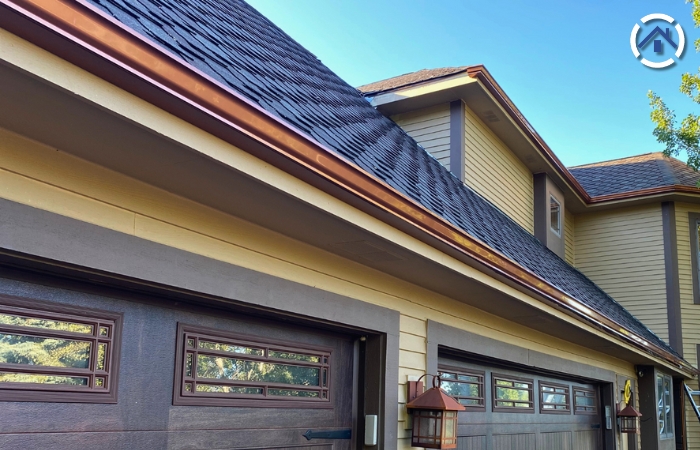
Gutters protect your home from water damage by directing rainwater away from the foundation, roof, and walls. Selecting the right gutter material for your home is essential for ensuring long-term performance and minimizing the need for maintenance. The ideal gutter material should be durable enough to withstand local weather conditions, aesthetically pleasing enough to match your home's exterior, and functional enough to handle the water flow from your roof.
Different gutter materials offer varying levels of durability, maintenance requirements, and visual appeal, so choosing one that aligns with your specific needs and preferences is important. This blog will explore the best gutter materials: steel, copper, aluminum, and vinyl/plastic. Each has unique characteristics, advantages, and disadvantages. We'll delve into the details of each to help you make an informed decision for your home.
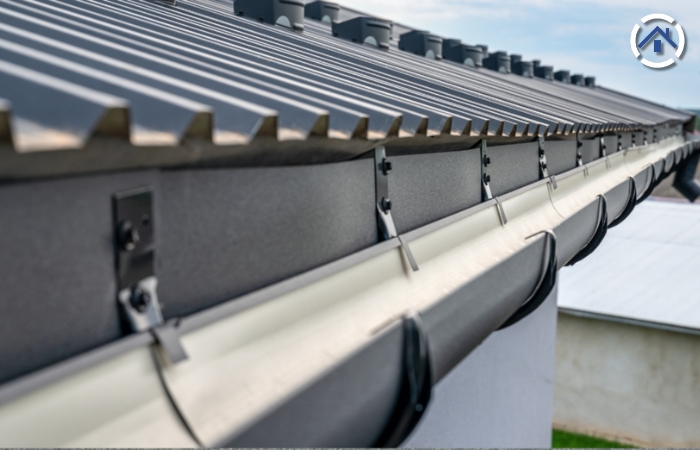
Steel gutters are renowned for their robust construction, making them a strong and reliable choice for many homeowners, making it one of the best gutter materials.
Common Types:
1. Galvanized Steel: Galvanized gutters are steel gutters coated with zinc to prevent rusting. While they are solid and durable, they can still rust over time if the zinc coating wears off, especially in harsh climates.
2. Stainless Steel: Due to their chromium content, stainless steel gutters are more resistant to rust and corrosion. They are a premium choice that offers long-lasting performance but comes at a higher cost than galvanized steel.
Advantages:
Disadvantages:
Ideal Use Cases:
Areas with Extreme Weather Conditions: Steel gutters are well-suited for regions that experience heavy snowfall, strong winds, or frequent storms.
Historic or Industrial-Style Homes: Steel gutters' sturdy and classic look complements historic or industrial-style buildings, adding to their aesthetic appeal.
Maintenance Tips:
Regular Inspections for Rust and Damage: Check your steel gutters periodically for any signs of rust or damage. Early detection can prevent more significant issues.
Application of Protective Coatings: Reapply protective coatings as necessary to maintain the gutters' rust resistance and extend their lifespan.
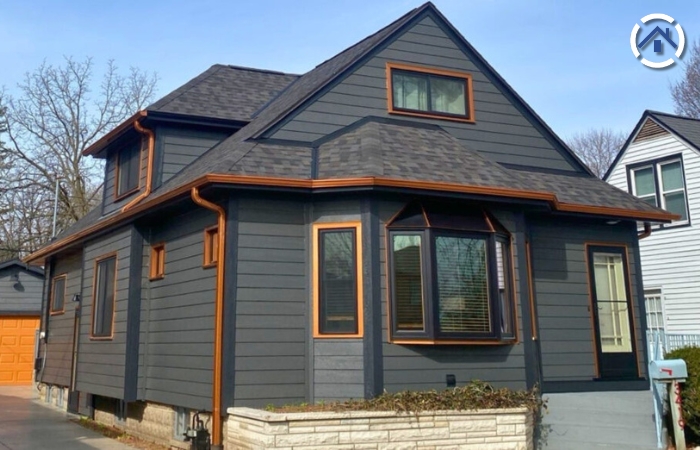
Copper gutters are a premium choice for their exceptional durability and unique aesthetic appeal. These gutters are beautiful as they age gracefully. The natural patina that develops over the years gives homes a charming, vintage look that is highly sought after in modern and historic homes. This patina adds to the gutter’s visual appeal and protects against corrosion.
Advantages:
Disadvantages:
Ideal Use Cases:
High-End Homes and Historic Restorations: Copper gutters are perfect for luxury properties and restoration projects where aesthetics and longevity are paramount.
Properties Where Aesthetic Appeal is a Priority: Ideal for homeowners who value copper gutters' unique and evolving look.
Maintenance Tips:
Occasional Cleaning to Maintain Appearance: Clean the gutters periodically to remove debris and maintain their appearance.
Inspection for Any Loose Fittings or Joints: Regularly check and tighten loose components to ensure the system remains secure and functional.
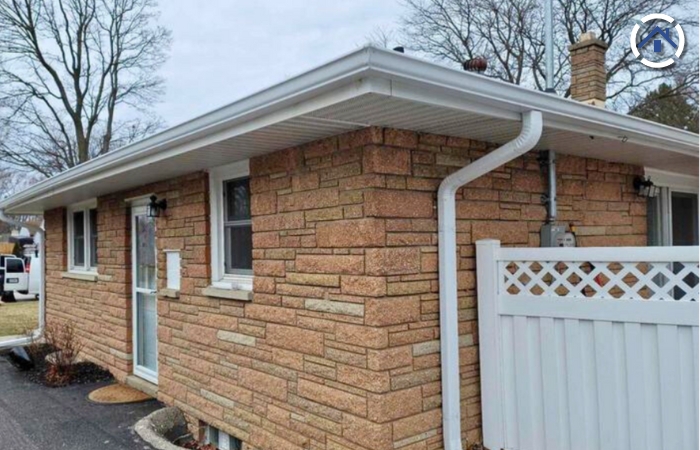
Aluminum gutters are a popular choice among homeowners due to their balance of cost, durability, and ease of installation. These lightweight gutters are rust-resistant, making them an excellent option for various climates.
Aluminum gutters offer a cost-effective solution without sacrificing performance. They are available in various colors and finishes, allowing homeowners to match or complement their home’s exterior.
Advantages:
Disadvantages:
Ideal Use Cases:
Residential Homes: Aluminum gutters are suitable for most residential applications due to their balance of cost and performance.
Budget-Conscious Projects: Aluminum gutters provide an affordable option for homeowners looking to replace or install new gutters without breaking the bank.
Maintenance Tips:
Regular Cleaning to Prevent Clogs: Keep the gutters clear of leaves, twigs, and other debris to ensure proper water flow and prevent blockages.
Inspection for Any Signs of Wear or Damage: Regularly check for dents, bends, or signs of corrosion, particularly if you live in a coastal area.
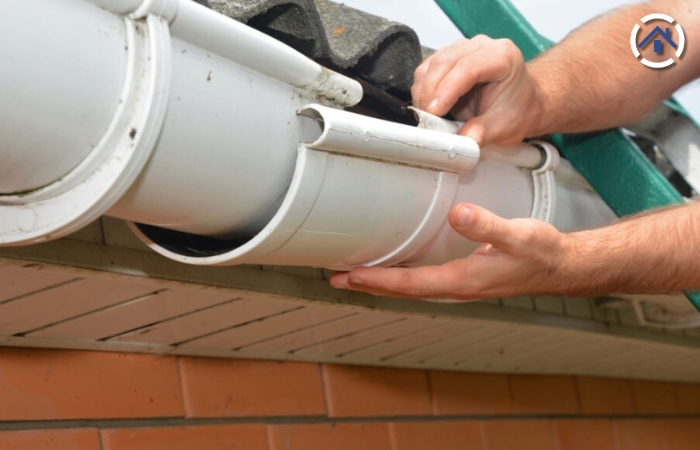
Vinyl gutters are made from durable plastic and are known for being budget-friendly and easy to install. They are resistant to rust and corrosion, making them suitable for areas with high humidity.
Vinyl gutters are an economical choice, especially appealing to homeowners looking for an affordable solution to install themselves.
Advantages:
Disadvantages:
Ideal Use Cases:
Maintenance:
Regular Cleaning to Prevent Blockages: Clean the gutters regularly to remove debris, such as leaves and twigs, ensuring the water flows smoothly.
Inspection for Cracks or Damage, Especially After Severe Weather: After storms or extreme weather, check for any signs of damage and address them promptly to maintain the integrity of the gutter system.
We've covered four popular gutter materials: steel, copper, aluminum, and vinyl/plastic. Steel stands out for its robustness but requires regular maintenance against rust. Copper offers durability and a unique patina, albeit at a higher cost. Aluminum balances affordability and performance, though it can dent easily. Vinyl/plastic, the most budget-friendly, is simple to install but lacks durability in harsh weather and color options.
Be sure to evaluate your specific needs, considering your local climate, budget constraints, and the style of your home. Choosing the right gutter material is a significant decision that can impact the durability and appearance of your home for years to come. For personalized advice and to ensure the best choice, consult a professional gutter installer. They can provide expert recommendations tailored to your unique requirements, ensuring your home is well-protected and aesthetically pleasing.